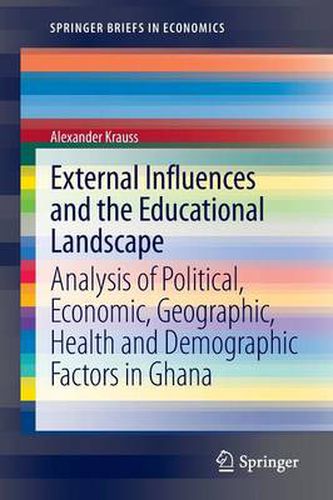Readings Newsletter
Become a Readings Member to make your shopping experience even easier.
Sign in or sign up for free!
You’re not far away from qualifying for FREE standard shipping within Australia
You’ve qualified for FREE standard shipping within Australia
The cart is loading…






This title is printed to order. This book may have been self-published. If so, we cannot guarantee the quality of the content. In the main most books will have gone through the editing process however some may not. We therefore suggest that you be aware of this before ordering this book. If in doubt check either the author or publisher’s details as we are unable to accept any returns unless they are faulty. Please contact us if you have any questions.
While the analysis is not the first to investigate empirically the effects of different individual or household factors on school access and completion of Ghanaians, it extends previous work by simultaneously incorporating individual, household, community, regional and national characteristics and also illustrates the latest evidence by applying international data sources and unusually detailed household survey data for a sub-Saharan country. Its focus is threefold: (i) gaining a richer understanding of which external influences hinder educational access and attainment in Ghana, (ii) how to better tackle these challenges and (iii) analyzing how educational development affects the country’s overall development. An interview with the Minister of Education helps guide the policy orientation of the analysis by identifying several critical challenges and areas of needed policy attention. Findings from the data analysis indicate that the geographic divide between the North and South, increased economic growth, demographic pressure and a number of individual, household and community factors especially children’s nutritional and labour status are the most important challenges in increasing levels of education among Ghanaians in years to come. Finally, the analysis pilots a new and comprehensive results- and capacity-focused policy matrix to help the Government of Ghana realign policy priorities and reform existing programs. To this end, respective policy levers on the demand- and supply-side are discussed, with particular reference to external and demand-side interventions which have not received the necessary attention at the policy-level to improve educational opportunities and outcomes at all levels.
$9.00 standard shipping within Australia
FREE standard shipping within Australia for orders over $100.00
Express & International shipping calculated at checkout
This title is printed to order. This book may have been self-published. If so, we cannot guarantee the quality of the content. In the main most books will have gone through the editing process however some may not. We therefore suggest that you be aware of this before ordering this book. If in doubt check either the author or publisher’s details as we are unable to accept any returns unless they are faulty. Please contact us if you have any questions.
While the analysis is not the first to investigate empirically the effects of different individual or household factors on school access and completion of Ghanaians, it extends previous work by simultaneously incorporating individual, household, community, regional and national characteristics and also illustrates the latest evidence by applying international data sources and unusually detailed household survey data for a sub-Saharan country. Its focus is threefold: (i) gaining a richer understanding of which external influences hinder educational access and attainment in Ghana, (ii) how to better tackle these challenges and (iii) analyzing how educational development affects the country’s overall development. An interview with the Minister of Education helps guide the policy orientation of the analysis by identifying several critical challenges and areas of needed policy attention. Findings from the data analysis indicate that the geographic divide between the North and South, increased economic growth, demographic pressure and a number of individual, household and community factors especially children’s nutritional and labour status are the most important challenges in increasing levels of education among Ghanaians in years to come. Finally, the analysis pilots a new and comprehensive results- and capacity-focused policy matrix to help the Government of Ghana realign policy priorities and reform existing programs. To this end, respective policy levers on the demand- and supply-side are discussed, with particular reference to external and demand-side interventions which have not received the necessary attention at the policy-level to improve educational opportunities and outcomes at all levels.